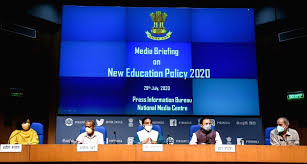NEW EDUCATION POLICY
The Union Cabinet has approved the new National Education Policy on Wednesday, 29 July 2020, introducing many drastic changes focusing on mother tongue and establishing a common higher education regulator for public and private institutions. The new policy envisages universalisation of education from pre-primary levels from ages 3 to 6 and introducing a curriculum including skill development from Class 6.
The final document of the educational policy specifically mentioned that there will be greater flexibility in the three language formula which was heavily criticised while submitting the draft policy in December, 2018 by the expert group headed by former ISRO chief K.Kasturirangan. The medium of instruction will be either home language, mother tongue, local language or regional language till the Class 5 or preferably till Class 8 and beyond. Sanskrit will be offered as an option at Schools and higher levels of education.
Indian knowledge systems including tribal and indigenous would be included into the curriculum in a scientific manner. Public spending on education will be raised to 6% of the GDP and a new regulator shall be established for the administration of higher education except for medical and legal courses in the country.
Some of the salient features are :
Flexible multi disciplinary under graduation degrees of 3-4 years will be introduced.
The present M.Phil courses will be abolished and a new pattern of education introduced.
Class 10 and 12 board examinations will be made easier to test competencies rather than memorising, allowing students to take the exam twice.
Semester systems will be introduced.
New accreditation system with independent authority for both public and private schools.
Four years integrated B.Ed degree course to be introduced for the teaching profession.
Private institutions will offer scholarships to students.
Meritorious students belonging SC, ST, OBC and Other socially and economically disadvantaged will be given incentives.
Four years Bachelors with research degrees will be introduced.
College affiliation system will be phased out within 15 years.
Every college develops into an autonomous institution, or constituent college of a University.
Foreign Universities can set up campuses in India.
Aims to create a new apex body, The National Education Commission headed by the Prime Minister.
The New Education Policy envisages to make India a global knowledge Superpower
The present educational policy was framed in 1986 and later revised in 1992.
Education being listed in the concurrent list of the Constitution, the new policy on education will definitely raise objections from various states in the country. Many critics are of the view that the unilateral initiative in the educational system with such greater centralisation and commercialisation of education will destroy the indian educational system to a great extent.


